#ancient macedonian army
Text

Alexander The Great Refusing Water In The Desert
by Tom Lovell
#alexander the great#art#tom lovell#alexander#desert#macedonian#army#history#antiquity#ancient greece#ancient greek#conquest#europe#european#ancient macedonia#macedonia
274 notes
·
View notes
Note
Your top 5 Alexander the Great moments?
Top Five Alexander Moments
One issue with answering this is to figure out what events actually happened, especially when it comes to anecdotes! Here are four I find either significant to understanding his charisma and/or which explain how he functioned and why he was successful, plus one I like just because I’m a horse girl.
1) To my mind, the event that best illustrates why his men followed him to the edge of their known world occurred in the Gedrosian Desert. While I’m a bit dubious that this trek was as bad as it’s made out to be (reasons exist for exaggerating), it was still baaaad. One story relates that some of his men found some brackish water in a sad little excuse for a spring, gathered it in a helm, and brought it to him. Given his poor physical condition after the Malian siege wound, he no doubt needed it badly. He thanked them (most sincerely), then carried it out where all (or at least a lot) of his men could see, raised it overhead, and announced that until all of them could drink, he wouldn’t. Then he poured it onto the rocky ground.
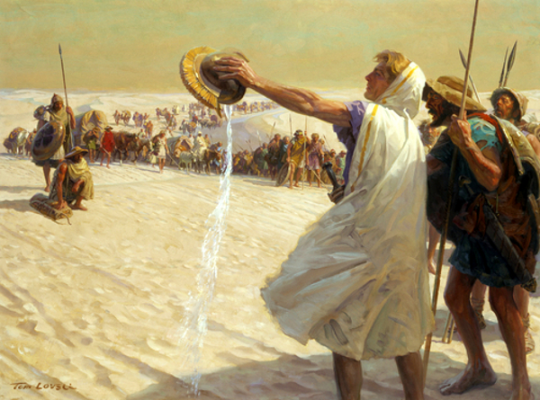
That gesture exemplified his charisma. And it absolutely is not something the likes of a Donald tRump could even imagine doing—nor most dictators, tbh. They’d be blaming everybody else and calling for heads while drinking Diet Coke, not suffering alongside their people.
This wasn’t an isolated event of that type. While he almost certainly didn’t have time to engage along with his soldiers in every project, we’re told he would drop in from time-to-time, to inspire them and to offer a little friendly competition.
He also dressed like his men for everyday activities, especially early in the campaign. As time went on, some sources say he inserted more distance—probably necessary as his duties exploded—but he still seems to have found time to “just hang out” with his Macedonians on occasion. The claims that he was too high and mighty to do so appears to have been exaggeration (as such accusations often are) in order to forward a narrative that he was “going Asian.” Troop resentment over court changes was very genuine—I don’t want to underplay it (especially as I’ve written about it in a few chapters in this), but it tended to boil up during certain periods/events, then die back again. Alexander was trying to walk a very fine line of incorporating the conquered while not ticking off his own people.
2) Reportedly, he once threw a man out of line because he hadn’t bothered to secure the chin strap on his helm. I pick this one because it tells me a whole lot about how he saw himself as a commander, and what he expected of his men (and why he tended to consistently win).
On the surface, his reaction seems almost petty. It’s precisely the sort of mistake students whine about when professors ding them for it. It’s just a chin strap! I’d have tightened it before I went into battle! (It’s just a few typos; you knew what I meant! Or, Why does everything in the bibliography have to be exactly matching in style? Who cares? What a stupid thing to obsess about!) These objections are all of a piece. First, they’re lazy, and second, they indicate a disconcern with details. In battle, such disconcern can get a person killed. And on a larger scale, for a general, such disconcern loses battles.
One of the striking aspects of Alexander’s military operations was just how well his logistics worked. Consistently. We hear little about them precisely because they rarely fail. Food and water was there when they needed it, as were arrow replacements, wood to repair the spears, wool and leather for clothes and shoes, canvas for tents, etc., etc. All those little niggling (boring) details. If these are missing, soldiers become upset (and don’t fight well). Starting with Philip, the Macedonian military was a well-oiled machine. That’s WHY Gedrosia was such a shock: the logistics collapsed. Contra some historians, he did not do it to “punish” his men, nor to best Cyrus.* He had a sound reason—to scout a trade route.
Alexander understood that details matter. It starts with a loose chinstrap. (Or an unplanned-for storm and rebellion in his rear.) Everything else can unravel from that.
3) Alexander sends Hephaistion a little dish of small fish (probably smelts). He also helps an officer secure the lady of his dreams. And writes another on assignment (away from the army) that a mutual friend is recovering from an illness. While technically three “moments,” these are all of a piece. Alexander knows his men, and is concerned not only for their physical well-being, but also their mental state: that they’re happy. Granted, these are all elite officers, but it suggests he’s paying attention to people. I’ve always assumed he sent Hephaistion the fish because they were his friend’s favorite, and/or they were a special treat and he wanted to share. That he didn’t punish an officer for going AWOL to chase the mistress he wanted but offered advice, and even assistance, on how to court and secure her suggests the same care.

I don’t want to take away from what appears to be his serious anger management problems(!), but little details like those above strike me as the likeable side of Alexander—why his men were so devoted to him.
4) Then we have the encounter with Timokleia after the siege of Thebes. While probably a bit too precious to have occurred exactly as related, I think it may still hold a kernel of truth.
Alexander had a reputation of chivalry towards his (highborn) female captives. If some of that was likely either propaganda from his own time or philhellenic whitewashing later by Second Sophistic authors such as Plutarch (and Arrian), poor treatment of women is not something we hear attributed to him.
Ergo, while the meeting was probably doctored for a moral tail, he may well have freed Timokleia as an act of clemency to put a better face on a shocking destruction he knew wouldn’t sit well with the rest of Greece—who he both wanted to cow yet earn support from. (A difficult balancing act.) Also, if Timokleia hadn’t been high-born, she’d probably have been hauled off to one of the prisoner cages with little fanfare.
Nonetheless, I find his actions surprising given the casual misogyny of his era. If we can take the bare bones of the story as true, and it’s not all invented, Timokleia was raped as a matter of course during the sacking of Thebes, then managed to trick her rapist and kill him by pushing him down a well and dropping rocks on him. I assume this happened when his men weren’t there, but they found out soon enough and hauled her in front of Alexander to be punished for killing an officer. To the surprise of all, Alexander decided the man had earned it and freed Timokleia. One might be inclined to call this overly sentimental, but….
There’s a similar story that occurred much later in the Levant, when two of Parmenion’s men seduced/(raped?) the mistresses/wives of some mercenaries. Alexander instructed Parmenion to kill the Macedonians if they were found to be guilty.
In both cases, we have an affront against (respectable) women. In the latter case, Alexander was (no doubt) working to avoid conflict between hired soldiers and his own men, who—in typical Greek fashion—would have looked down on mercenaries as a matter of course. Some sort of conflict between Macedonians and Greek mercenaries up in Thrace had almost got Alexander’s father killed. Alexander saved him. No doubt that was on Alexander’s mind here.
Yet what both events illuminate is a willingness on Alexander’s part to punish his own men for affronts to honor/timē that involved women. Yes, this is clearly about discipline. But it also shows an unusual sensitivity to sex crimes in warfare: actions that would normally fall under the excuse of “boys will be boys” (especially when their blood is up).
I doubt he’d have felt the same about slaves or prostitutes; he was still a product of his time. Yet without overlooking his violence—sometimes extreme (the genocide of the Branchidai, for instance)—I find his reaction in these cases to be evidence of an atypical sympathy for women that I’d like to think isn’t wholly an invention of later Roman authors. And just might show the influence of his mother and sisters.
5) Last… the Boukephalas story…because who doesn’t love a good “a boy and his horse” tale? Obviously the Plutarchian version is tweaked to reflect that author’s later concern to contrast the Macedonian “barbarian” Philip with the properly Hellenized Alexander. Ignore the editorializing remarks, especially the “find a kingdom big enough for you” nonsense.
But the bare bones of the story seem likely: unmanageable horse, cocky kid, bet with dad, gotcha moment. You can imagine this was an anecdote Alexander retold a time or three, or twenty.
——
* His attempts to copy Cyrus may be imposition by later writers. In his own day, he may have cared more about the first Darius, for reasons Jenn Finn is going to explain in a forthcoming, very good article on the burning of Thebes and Persepolis.
#asks#Top Five Alexander the Great moments#Alexander the Great#Hephaistion#Hephaestion#Timoclea#Timoklea#Boukephalas#Bucephalas#Gedrosian Desert#ancient military logistics#Macedonian army#Alexander's logistics#Classics#ancient history#campaigns of Alexander the Great#tagamemnon
54 notes
·
View notes
Text
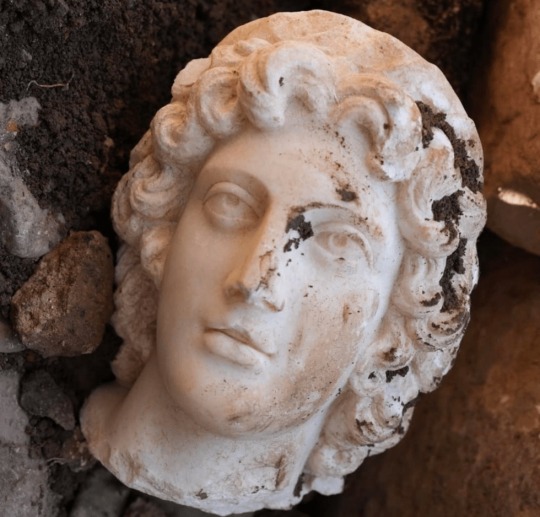
Marble Head of Alexander the Great Uncovered in Turkey
The head of a statue determined by archaeologists to belong to Alexander the Great, was unearthed during excavations in north-western Turkey.
The marble head, dated to the 2nd century AD, was found at the top of a theater in the ancient city of Konuralp, near modern-day Düzce.
While most parts of the ancient theater have been unearthed during the excavations, similar historical remains such as the head of the Apollo statue and the head of Medusa were previously found in the upper part of the structure.
During the excavations carried out in the Konuralp Ancient Theater excavation area, archaeologists identified an artifact in the ground at the top of the theater area. As they kept digging, they removed the artifact, which appeared to be the head of a bust.
As a result of the consultation of history experts, it was determined that the bust head found belonged to the Macedonian King Alexander the Great.
In a statement, Konuralp Museum provided information about why they determined the bust to belong to Alexander the Great.
“The head, measuring 23 centimeters [from head to neck] was found during the excavations in the ancient theater. It is depicted with deep and upward-looking eyes made of marble, drill marks on the pupil and a slightly open mouth that does not show much of its teeth.
“His long curly hairstyle up to his neck and two strands of hair [Anastoli] in the middle of his forehead are like the mane of a lion. This depiction is a hair type typical of Alexander the Great,” the statement said.

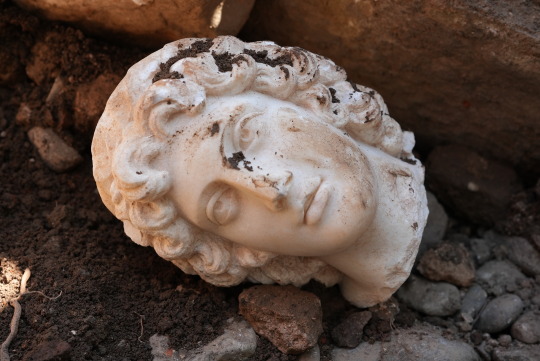
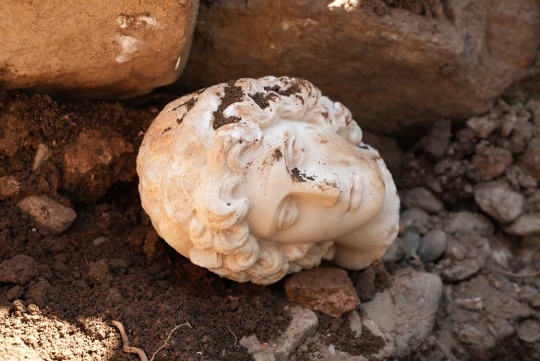
The marble head of Alexander the Great delivered to Konuralp Museum
Historical Konuralp is 8 km north of Düzce; first settlements there go back to 3rd century BC. Until 74 BC, it was one of the most important cities belonging to Bithynia, which included Bilecik, Bolu, Sakarya, Kocaeli.
It was conquered by Pontus and then by the Roman Empire. During the Roman period, the city was influenced by Latin culture, and it changed its name to Prusias ad Hypium. Later on Christianity affected the city and after the separation of the Roman Empire in 395, it was controlled by the Eastern Roman Empire (the later Byzantine Empire).
In 1204, the Crusader armies invaded Constantinople, establishing the Latin Empire. Düzce and its surroundings are thought to be under the dominance of the Latin Empire during this period. Düzce was under Byzantine rule again from 1261 to 1323.
The Konuralp Museum has some rare exhibits. A 1st-century sarcophagus, Orpheus mosaic, the mosaic of Achilles and Thetis and the 2nd-century copy of Tyche and Plutus sculpture are among the notable items in the museum. There are 456 ethnographic items.
In the ethnography section clothes, weapons, and daily-usage articles about the late Ottoman era are exhibited. There are also 3837 coins from Hellenistic to Ottoman era.
By Tasos Kokkinidis.
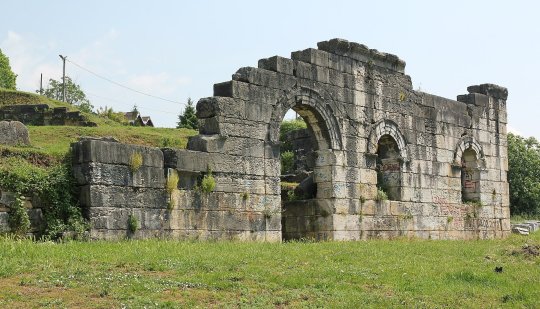

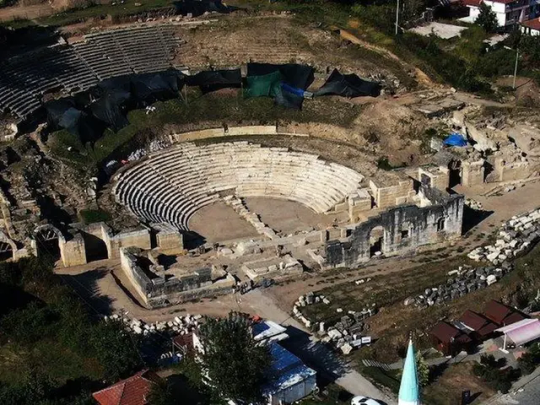
#Marble Head of Alexander the Great Uncovered in Turkey#ancient city of Konuralp#Konuralp Ancient Theater excavation area#marble#marble sculpture#ancient marble sculpture#ancient artifacts#archeology#archeolgst#history#history news#ancient history#ancient culture#ancient civilizations#roman history#greek history#ancient art
281 notes
·
View notes
Photo
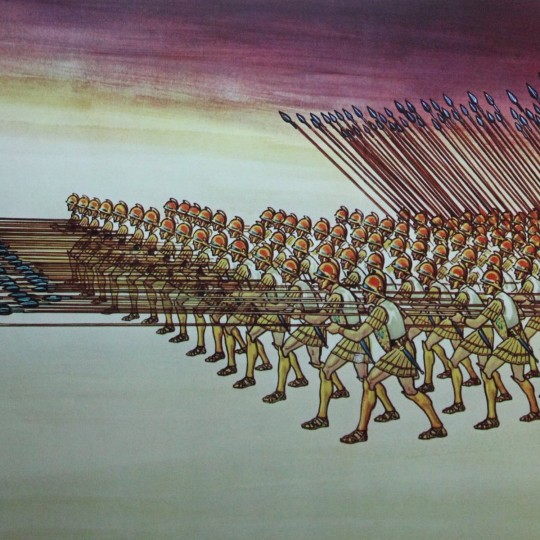
Pezhetairoi
The pezhetairoi (foot companions) were part of the imposing army that accompanied the Macedonian commander Alexander the Great (r. 336-323 BCE) when he crossed the Hellespont to face the Persian king Darius III in 334 BCE. Armed with long pikes (sarissas), the pezhetairoi fought in a Greek phalanx formation and played an important role in the battles of the Granicus, Issus, and Gaugamela.
Origin
Like with the hypaspist, the origin and evolution of the pezhetairos (plural: pezhetairoi) are shrouded in mystery. Except for references to them in discussions of Philip II and Alexander, the term pezhetairoi is hardly found in ancient literature. In his The Army of Alexander the Great, historian Stephen English wrote that, at some inexact point, the peasantry was recruited territorially and organized into infantry, and, according to the historian Anaximenes, it was given the name pezhetairoi. He added that the pezhetairoi were "essentially an evolution of the standard phalanx" (3).
However, disagreements still persist: some scholars refer to all of the Macedonian infantry as pezhetairoi while others believe they were not front-line infantry but bodyguards to the king. English contends that the pezhetairoi may have been created as a select, elite infantry acting as royal bodyguards under the Macedonian king Alexander I (498-454 BCE). It is claimed by some that this elite infantry eventually became the hypaspists. It was Alexander III (the Great) who would extend the term pezhetairoi to include all of the heavy phalanx infantry with the exception of the hypaspists.
Continue reading...
51 notes
·
View notes
Note
were there any specific styles/cultures you took inspiration from when designing the telchin clothing styles?
Honestly the tricky answer is: a lot-
Initially, it was very much just like “okay does this shape and colour palette and design look cool? Sick” and just throwing thoughts at a wall.
When it came to defining those broader shapes/colours and adding things like specific cuts, details, patterns, etc, I sort of worked backwards to grab inspirations.
Ulysses initial/main outfit is honestly quite Medieval, European (but notably Norse/Scandinavian in its cut/style), albeit with a ridiculously plunging neckline for some reason lol-
(it was even a bit early on that every time one of the cast drew Ulysses, we’d make his neckline just a little bit sluttier)
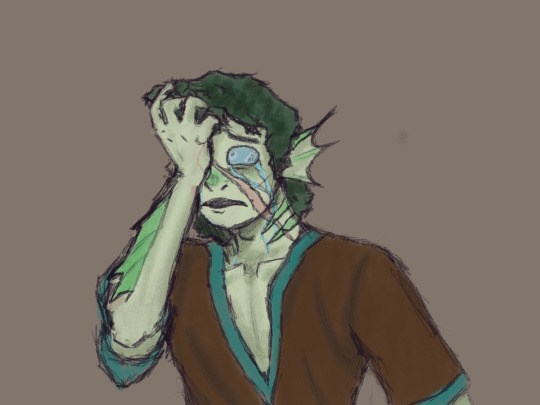
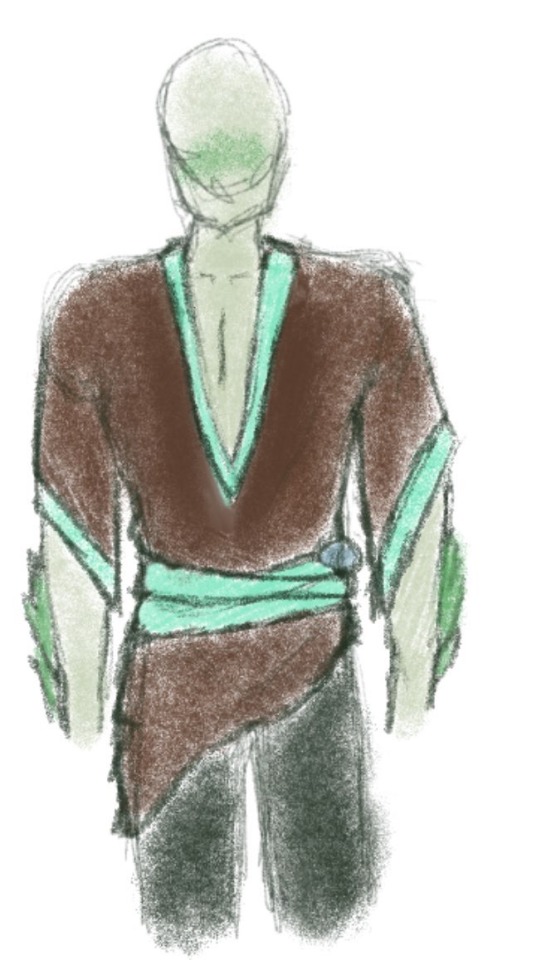
HOWEVER the details on the collar and sleeves are directly lifted from ancient Greco-Roman designs, specifically influenced by the “Greek Key” or “Greek Meander” pattern which can be seen in pottery, jewellery and architecture all over the ancient Mediterranean!

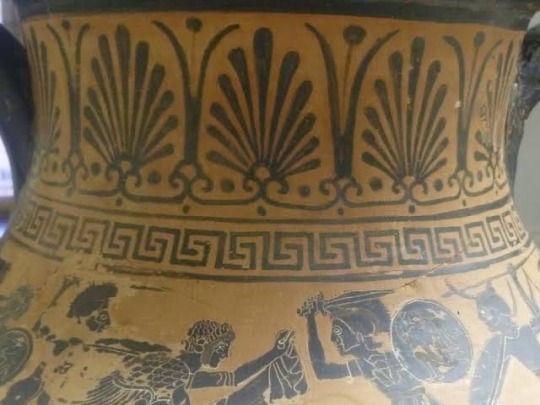
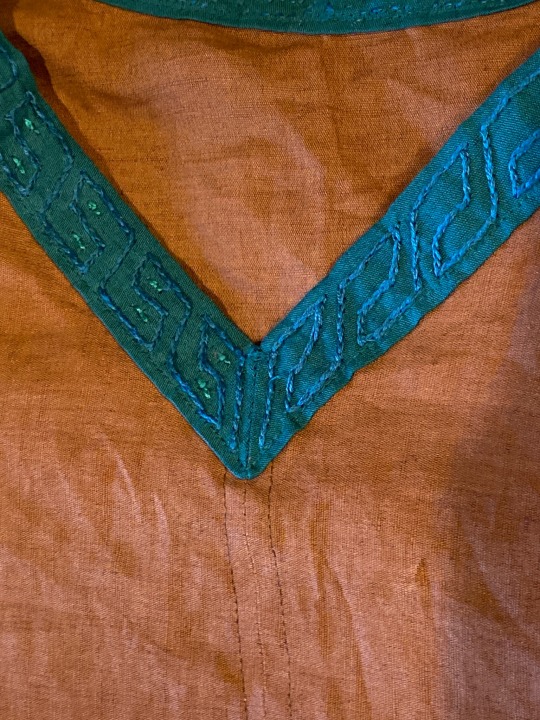
Specific to Ulysses, his clothing has currently reached a fairly fairytale-esque “fantasy” stage, drawing a lot of early Renaissance and pirate-style influences with his little poet-shirt and sash, since he’s been on the Overworld so much, and is slowly growing to become a part of that culture and world, and I really wanted to show that in his clothing changes.
Honestly, a lot of the broader telchin clothing when I have sketched it up is very Greco-Roman, at least in the way I tend to depict it (that is my field of expertise, given my degree haha) but there’s honestly a lot of broader Mediterranean ties in as well. The army and their armour is designed to be very Ancient Macedonian, and a lot of the more casual clothing skew very Ancient Egyptian.
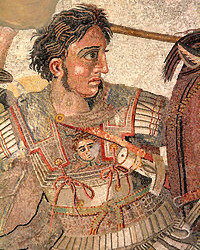

Canonically the Telchin clothing style also definitely develops rapidly over the course of the war with the drowned, mostly for practicality sake more than fashion (loose flowing fabrics aren’t doing anyone much good escaping the undead), leading to an almost 1950s/60s American aesthetic? Of course still mingled with the Greco-Roman patterns. Especially in the way the scientists are presented in lore/my art, they always had a very retro-60’s almost sci-fi scientist aesthetic. If I was to give it a fancy/proper-sounding name I think “Wartime-Americana Retro-Classicism” would be more or less it, potentially lmao-
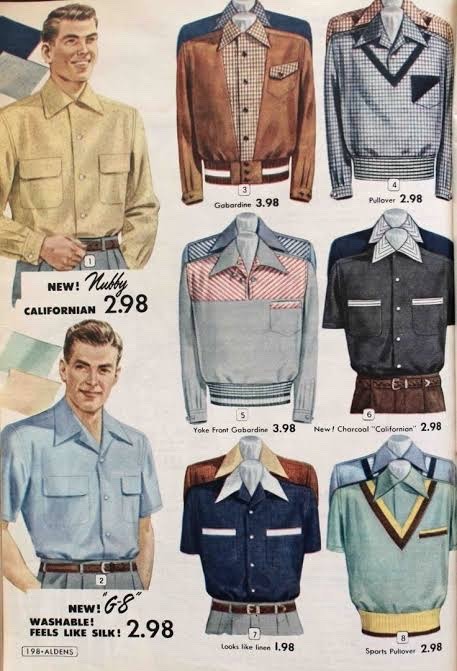
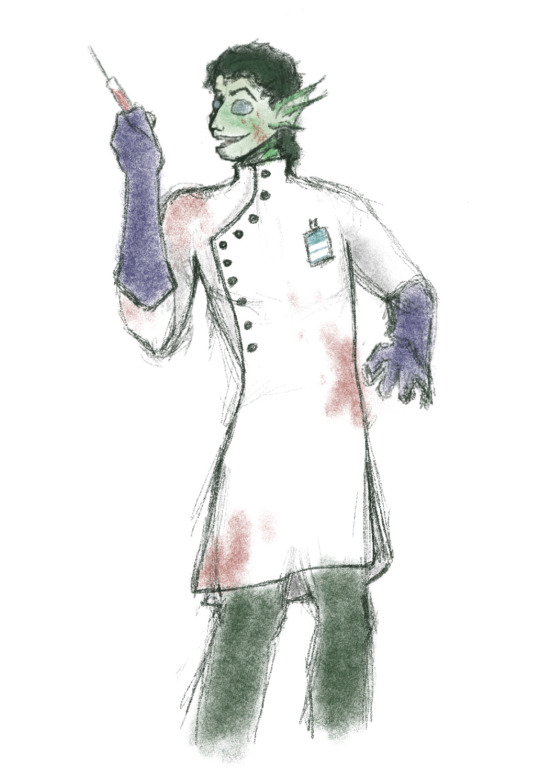

(You can even sort of see similar shapes and patterns in that first reference image to Ulysses eventual design!)
There was of course always a flair of Victorian-Mad-Scientist too, because I have a bit of a brand and I can’t help myself. And given the blurring of science, alchemy and magic in Fable I think it definitely fits.
It’s a shame Tumblr only lets me upload 10 images per post on mobile because I have A BUNCH of reference images for all of these stages of the Ulysses/broader telchin clothing design lol, but sadly I can’t include them here :(
But I hope this was somewhat useful/interesting!! I’ve had so much fun coming up with this kind of stuff over the course of Fable s3 for the telchin and I’m very grateful to Ocie and Metta for kind of just letting me go ham on a bunch of aspects like this lol-
57 notes
·
View notes
Text
The Lost Queen - III
— summary: You woke up near a military camp without remembering how and why you got there, you didn’t understand why they were dressed like ancient Greeks, all you knew was that you weren’t safe and you needed to get out of that place as soon as possible. Too bad for you that you found yourself attracting unwanted attention from the Macedonian King and he won’t let you go so easily.
— genre: yandere, dark!au.
— warnings: time travel, obsessive and possessive behavior, murder, mention of torture, kidnapping, angst, fluffy (very rarely), dub-con, possibly smut.
— pairing: yandere!alexander the great x female!reader, yandere!generals x female!reader
— word count: +1,605.
— tag list: @devils-blackrose, @faerykingdom, @hadesnewpersephone, @mariaelizabeth21-blog1 , @kadu-5607, @zoleea-exultant
— the lost queen series masterlist.
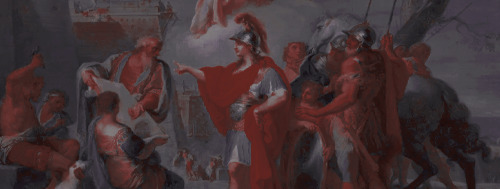

Chapter 3
''I wouldn't trust her if I were you, Alexander.''
Alexander looks up at the map he was studying when Parmenion decided to speak. He stared at the general, waiting for him to finish speaking.
''We don't know anything about her and there's clearly something wrong about her.'' Parmenion finished speaking, feeling slightly disturbed by the King's piercing gaze.
''I wouldn't trust her either if I were Parmenion, but I'm Alexander.'' He replied, turning his eyes to the map. It was a map of the most convenient routes for the entire army to pass. They were hunting Bessus and the best choice would be Bactria.
Alexander smirked when he heard a light laughter and he didn't even need to look to know it was Hephaestion. His best friend and closest companion forever. Alexander wouldn't know what to do if something happened to him.
''We don't know anything about her, as you say,'' Alexander began, looking at Parmenion again, ''which is why I have decided that she is not a threat.''
''And how can you be sure of that?'' Cassander grumbled loudly. Alexander looked at him with a stern expression, but the general didn't even flinch.
''Are you questioning your King?'' His voice was low but deadly. A pretty clear warning.
Apparently Cassander had no self-preservation as he glared at Alexander with a hateful expression on his face. The King leered at him as if daring him to say something.
Wisely, Cassander kept silent.
Satisfied with that, Alexander continued to speak, ''She's just a confused young woman. What risks might it present to an army? For Alexander's army?''
No one answered.

Running away wasn't the most viable option, you realized very quickly. And besides, where would you go?
You didn't know anything about this place, the people and you were very far from home. Both in distance and in time.
So how would you run away? If you ran away it would be worse for you. They might not be so... Benevolent. And bad things could happen to you. You could be robbed, abused, murdered or even enslaved.
So no, running away was definitely not a viable option. For now.
You needed a plan. A strategy. You needed to survive at any cost. It was no longer a choice, it was a necessity. You couldn't go on any longer in that time, you needed to go back to your home, your family and your friends.
Your family...
Your heart squeezed inside your chest at the thought of your parents. You hadn't thought about them since you came across this place.
How were they? Had they already noticed your absence? Fuck, you felt like crying again. Your mind conjuring up images of your parents devastated by your disappearance, and that is if they even know you're gone. Your vision blurred as more tears rolled down your face.
You hated crying that much. You hated that feeling of desperation, like there was a lurking monster waiting to attack you.
Your eyes were already stinging from your previous bout of crying and they stinged even more as new tears formed. You wanted to stop crying, you wanted to pretend that this was a nightmare and you would wake up in your comfortable bed, that there would be walls around your instead of a tent canvas, that there would be LED lights and electronic devices around your and not candles and an empty tent.
You hated hearing the noise of the soldiers outside, the horses and the swords waving.
You hated it all.
''Excuse me?''
Your head whipped around at the sound of a voice and it honestly hurt a little. You tried to look at the man but your vision was blurry from tears, but you recognized him as the man you had found attractive.
The one with the blond hair and dark blue eyes.
''Wh-What do you want?'' Your voice was choked and harsher than you expected, but it didn't matter at the moment.
''I...'' He faltered for a moment at the sight of you crying and his chest tightened at the sight, ''I came to check on you.''
You frowned but decided not to argue.
He took a step forward, approaching the cot where you were sitting and collapsing.
''Are you... okay?'' His voice was low but there was genuine concern.
You looked up, still teary-eyed, and he fell silent instantly.
''May I?'' He pointed to the cot beside you. You thought for a moment and nodded. The cot moved a little as he sat down next to you, his shoulders close to yours and thighs almost touching. You shuddered a little at the contact, but you kept silent, trying to stop the tears.
''Your name is (Y/N), right?'' You nodded at his question, ''I'm Perdiccas. It's an honor to meet you.''
Perdiccas...
His name was not unfamiliar to you and you choked on your own saliva as you remembered who he was. He was the regent of Alexander's Empire after the latter's death.
He smiled at you and your heart skipped a beat to see him smiling. Perdiccas reached up with callused fingers and touched your cheekbones, wiping away the tears. You blushed at the touch but allowed him to wipe away your tears.
''Th-Thanks...'' You mumbled and he just nodded.
''You shouldn't cry.'' He whispered and closed his eyes, ''It doesn't suit you.''
You arched your eyebrows. Doesn't suit you? For the love God! He didn't even know you and talked like you were best friends.
''I'm sorry but you don't know me to say whether it suits me or not. You doesn't know anything about me.'' You decided to be direct. He seemed to be kind, at least that's what you assumed, it didn't look like he wanted to hurt you.
Perdiccas laughed a little, ''You're right. I don't know you but I'd love to do it.'' He said and got up from the cot, smiling gently at you.
''Why?''
He shrugged, walking to the flap of the tent. ''I don't know.'' Perdiccas confessed, still smiling at you, ''But I wish I could be your friend, (Y/N). Am I pronouncing your name right?''
''Yes...''
Perdiccas bowed slightly, in an act of play, you know. Greeks bow to none but the gods.
''I hope to see you tonight.''
You got confused, ''Tonight? What's happening tonight?''
Perdiccas chuckled, “A feast in Alexander's tent. You were invited.''
What?
''Oh...'' You frowned, ''I don't have anything to wear...'' You tried to come up with an excuse for not having to attend and that was the only one you thought of at that moment.
But apparently that would not be accepted.
''Don't worry about that. I'll send you a chiton, along with some jewelry.'' Your eyes widened upon hearing his words.
''I...''
Perdiccas laughed, ''Thank me later. But I hope to see you there, (Y/N). I wish I could be your friend...'' He left before you could answer him.
Oh dear... It was all so...
Unbelievable.
And Perdiccas was even more so. Why was he being so nice to you? And why do you like it?
Your mind screamed desperately for you not to trust anyone but yourself, but your heart... Your heart told you to make friends, allies and maybe they could help you get back home.
Yes. Maybe making friends with Perdiccas isn't so bad after all.
Your heart will be your downfall.

You feel awkward and uncomfortable while being washed by servants sent by Perdiccas. You assumed so since he was the only one talking to you.
You tried to avoid it at first, but they wouldn't have it and soon you found yourself undressed and being bathed.
You were sure this was your most embarrassing moment in the world. You haven't needed help bathing since you were a small child and now...
Here you were having your hair and your body washed. Your face and body were totally red with embarrassment and you were even redder when you were pulled out of the water and dressed.
''This is so inconvenient,'' you thought as a servant adorned your hair with a jewel General Perdiccas sent you.
''There, lady.'' She said and bowed slightly, leaving the tent along with the other maids as you were dressed for the feast.
You didn't know what you looked like, you didn't know if you looked pretty or if you looked like a clown. You prayed it wasn't the last option. There were no mirrors available, so you decided to trust the servants' judgment.
You were dressed in a white chiton with some gold straps, it looked quite nice, although loose but it made you more comfortable. An ancient greek sandal and some lent jewelry. You took a deep breath, trying to calm the panic that started to build in your body.
You could do this.
You could go to that feast, make allies, and when you finally did, leave this place.
''Are you ready?'' Your eyes went towards Perdiccas, standing at the entrance of the tent and looking at you with shining eyes. You studied him a bit, noting that he was also well dressed, no armor or weapons in sight, just a white chiton and a few ornaments.
You nodded nervously and let him walk over and hook your arm through his.
You would do it. You would make it.
And so, close to each other, you and Perdiccas started walking to where the feast would be, the loud noise welcoming you.

— lady l: weren't you expecting a chapter today? Well, neither do I! I planned to post on saturday but as I'm going to travel, so here it is. I know there were no interactions between Y/N and Alexander, but I wanted to show how her relationship with one of the generals will be! In the next chapter there will be interactions between Y/N and Alexander! I hope you like it and forgive me for any mistakes! If you want to talk, send theories or anything, I'm always open. I love you all! ❤️
#yandere history#history#yandere historical characters#yandere alexander the great#yandere alexander the great x reader#alexander the great x reader#long fic#long fanfic#the lost queen
380 notes
·
View notes
Text
Alexander and the Gordian knot—cutting the Gordian knot
Here’s another manifestation challenge for the masses and nothing has changed except the formatting and the execution. I hope you all find this challenge fun and helpful, and I'm always wishing you success.
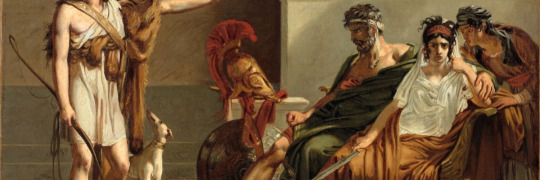
I do not consider the law of assumption to be complex but many do not share the same sentiments—and that's fine; to a lot of people, manifesting their desires seems to be an extremely difficult and tedious task. It doesn't need to be that way though and this challenge was designed to demonstrate how easily you can apply the law of assumption.
Alexander and the Gordian knot
Cutting the Gordian knot—A Law of Assumption challenge
Alexander and the Gordian knot
As the story goes, in 333 B.C. the Macedonian conqueror marched his army into the Phrygian capital of Gordium in modern-day Turkey. Upon arriving in the city, he encountered an ancient wagon, its yoke tied with what one Roman historian later described as “several knots all so tightly entangled that it was impossible to see how they were fastened.”
Phrygian tradition held that the wagon had once belonged to Gordius, the father of the celebrated King Midas. An oracle had declared that any man who could unravel its elaborate knots was destined to become ruler of all of Asia.
According to the ancient chronicler Arrian, the impetuous Alexander was instantly “seized with an ardent desire” to untie the Gordian knot. After wrestling with it for a time and finding no success, he stepped back from the mass of gnarled ropes and proclaimed, “It makes no difference how they are loosed.” He then drew his sword and sliced the knot in half with a single stroke. — History website.
“Sometimes the best answer to a complex problem is the simplest one.”
Cutting the Gordian knot—A Law of assumption challenge
We’re gonna turn the seemingly complex equation that is the Law of Assumption—into a simple task with a simple application. This challenge will last for two weeks and you can start anytime that you wish!
Rules for the challenge
Do not consume any Law of Assumption-related content during the challenge.
Disregard any questions you may have about the Law of Assumption and trust yourself.
Stick to the routine provided in this post.
Continue to apply the law of assumption after the challenge is finished.
The challenge routine
Before you start your day—I encourage you to immerse yourself in the feeling of the wish fulfilled for about ten minutes.
Throughout the day I encourage you to practice self-curiosity; imagine a state that you want to be in something that you love. Something that implies you are successful in conquering your sin. Then I want you to ask that state a million questions. Create your own questions. How would that version of me feel? How would I think? How would they speak to themselves? Is it calm in their mind? Are they disturbed by this or that? What do they do? How would they feel when they walk or speak to people? Would they be scared of what I am afraid of? How would they breathe, in a sure relaxing manner? What is their perspective on themself? How do they treat themselves? What do they see? What do they hear in their world? Of course this is all you. Every honest answer you give is you. This exercise to arouse a sleeping state of yourself within you. To stir it up and start changing from the inside out. Then start to see from their world. Hear what they hear. Feel what they feel. Frequently go back to them and become curious about a different side, or state of you! Then you will see how intimate you are with this version of you. That is is actually INSIDE you. You don't need to rearrange the outside first before you rearrange the inside but REARRANGE SELF INSIDE! If you persist in anything in life, persist in a change of Self! — Edwardart, “Self-curiosity"
When you're ready to end the day—recant your day in imagination and revise!
Troubleshooting
The 3D doesn't matter—continue to live your life as normal.
Thoughts are an indicator of your state, don't try to combat unfavorable thoughts and change your state instead.
Time doesn't matter.
Stop looking for approval in the 3D. If you're still looking for proof of your desire then you're not fulfilled.
Do not worry about the when or the how and focus on the end.
#aphrodieties#law of assumption#neville goddard#manifesation#law of manifestation#william blake#edward art#manifesting#law of abundance#self concept
90 notes
·
View notes
Text
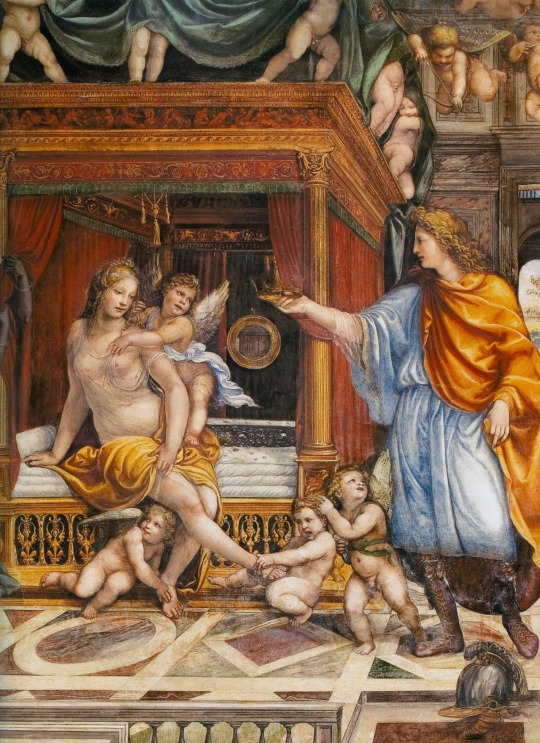
Marriage of Alexander and Roxana by Il Sodoma, 1517 CE
"Roxana (c. 340 – 310 BC, Ancient Greek: Ῥωξάνη; Old Iranian: *Raṷxšnā- "shining, radiant, brilliant, little star"; sometimes Roxanne, Roxanna, Rukhsana, Roxandra and Roxane) was a Sogdian or a Bactrian princess who Alexander the Great married after defeating Darius, ruler of the Achaemenid Empire, and invading Persia. The exact date of her birth is unknown, but she was probably in her early teens at the time of her wedding.
Alexander married Roxana despite opposition from his companions who would have preferred a Macedonian or other Greek to become queen. However, the marriage was also politically advantageous as it made the Sogdian army more loyal towards Alexander and less rebellious after their defeat.
To encourage a better acceptance of his government among the Persians, Alexander also married Stateira II, the daughter of the deposed Persian king Darius III.
After Alexander's sudden death at Babylon in 323 BC, Roxana is believed to have murdered Stateira. According to Plutarch, she also had Stateira's sister, Drypetis, murdered with the consent of Perdiccas.
By 317, Roxana's son, called Alexander IV lost his kingship as a result of intrigues started by Philip Arrhidaeus' wife, Eurydice II. Afterwards, Roxana and the young Alexander were protected by Alexander the Great's mother, Olympias, in Macedonia. Following Olympias' assassination in 316 BC, Cassander imprisoned Roxana and her son in the citadel of Amphipolis. Their detention was condemned by the Macedonian general Antigonus in 315 BC. In 311 BC, a peace treaty between Antigonus and Cassander confirmed the kingship of Alexander IV but also Cassander as his guardian, following which the Macedonians demanded his release. However, Cassander ordered Glaucias of Macedon to kill Alexander and Roxana. It is assumed that they were murdered in spring 310 BC, but their death was concealed until the summer. The two were killed after Heracles, a son of Alexander the Great's mistress Barsine, was murdered, bringing the Argead dynasty to an end."
-taken from Wikipedia
40 notes
·
View notes
Text


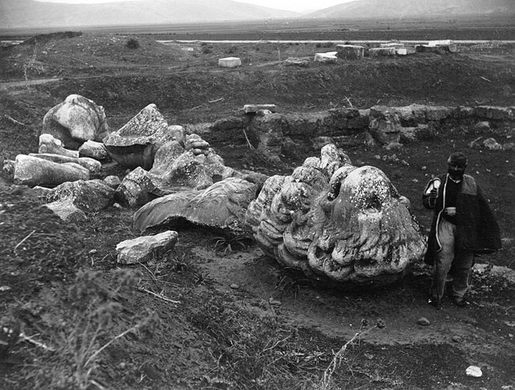
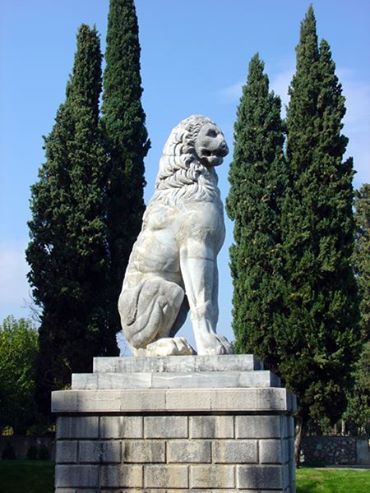
The Sacred Band of Thebes (Ancient Greek: Ἱερός Λόχος, Hierós Lókhos) was a troop of select soldiers, consisting of 150 pairs of male lovers which formed the elite force of the Theban army in the 4th century BC, ending Spartan domination. Its predominance began with its crucial role in the Battle of Leuctra in 371 BC. It was annihilated by Philip II of Macedon in the Battle of Chaeronea in 338 BC.
According to Plutarch, the 300 hand-picked men were chosen by Gorgidas purely for ability and merit, regardless of social class. It was composed of 150 male couples, each pair consisting of an older erastês (ἐραστής, "lover") and a younger erômenos (ἐρώμενος, "beloved"). Athenaeus of Naucratis also records the Sacred Band as being composed of "lovers and their favorites, thus indicating the dignity of the god Eros in that they embrace a glorious death in preference to a dishonorable and reprehensible life", while Polyaenus describes the Sacred Band as being composed of men "devoted to each other by mutual obligations of love".
Defeat came at the Battle of Chaeronea (338 BC), the decisive contest in which Philip II of Macedon, with his son Alexander the Great, extinguished Theban hegemony. The battle is the culmination of Philip's campaign into central Greece in preparation for a war against Persia. It was fought between the Macedonians and their allies and an alliance of Greek city-states led by Athens and Thebes. Diodorus records that the numbers involved for the two armies were more or less equal, both having around 30,000 men and 2,000 cavalry.
The traditional hoplite infantry was no match for the novel long-speared Macedonian phalanx: the Theban army and its allies broke and fled, but the Sacred Band, although surrounded and overwhelmed, refused to surrender. The Thebans of the Sacred Band held their ground and Plutarch records that all 300 fell where they stood beside their last commander, Theagenes. Their defeat at the battle was a significant victory for Philip, since until then, the Sacred Band was regarded as invincible throughout all of Ancient Greece. Plutarch records that Philip II, on encountering the corpses "heaped one upon another", understanding who they were, wept and exclaimed,
Perish any man who suspects that these men either did or suffered anything unseemly.
— Plutarch, Pelopidas 18
Pausanias in his Description of Greece mentions that the Thebans had erected a gigantic statue of a lion near the village of Chaeronia surmounting the tomb of the Thebans killed in battle against Philip.
In 1818, a British architect named George Ledwell Taylor spent a summer in Greece with two friends at Livadeia. On June 3, they decided to go horseback riding to the nearby village of Chaeronea using Pausanias' Description of Greece as a guidebook. Two hours away from the village, Taylor's horse momentarily stumbled on a piece of marble jutting from the ground. Looking back at the rock, he was struck by its appearance of being sculpted and called for their party to stop. They dismounted and dug at it with their riding-whips, ascertaining that it was indeed sculpture. They enlisted the help of some nearby farmers until they finally uncovered the massive head of a stone lion which they recognized as the same lion mentioned by Pausanias. Parts of the statue had broken off and a good deal of it still remained buried. It was later pieced back together in 1902 after obtaining permission from the Greek government.
In the late 19th century, excavations in the area revealed that the monument stood at the edge of a quadrangular enclosure. The skeletons of 254 men laid out in seven rows were found buried within it. A tumulus near the monument was also identified as the site of the Macedonian polyandrion where the Macedonian dead were cremated. Excavation of the tumulus between 1902 and 1903 by the archeologist Georgios Soteriades confirmed this. At the center of the mound, about 22 ft (6.7 m) deep, was a layer of ashes, charred logs, and bones about 0.75 m (2.5 ft) thick. Recovered among these were vases and coins dated to the 4th century BC. Swords and remarkably long spearheads measuring about 15 in (38 cm) were also discovered, which Soteriades identified as the Macedonian sarissas.
109 notes
·
View notes
Text
Paleontology is cool and all, but did you know that
War pigs are pigs reported to have been used in ancient warfare as military animals, mostly as a countermeasure against war elephants.
In the 1st century BCE, the Roman author Lucretius noted that humans may have attempted to launch wild beasts, such as lions or "savage boars", against the enemy, but with catastrophic results. In 272 BCE, it was recorded that the Romans used wild boars in their fight against the war elephants of the Tarantines. According to a legend recounted in the "Alexander Romance" by Pseudo-Callisthenes, the Macedonian Emperor Alexander the Great learned about this "secret weapon" against war elephants from King Porus in India.
The Roman naval and army commander Pliny the Elder reported that "elephants are scared by the smallest squeal of the hog". Roman author and teacher Aelian confirmed that elephants were frightened by squealing pigs and rams with horns, and reported that the Romans exploited both squealing pigs and horned rams to repel the war elephants of Pyrrhus in 275 BCE. Byzantine Greek scholar Procopius, in History of the Wars, recorded that the defenders of Edessa suspended a squealing pig from the walls to frighten away Khosrau's single siege elephant in the 6th century CE.
Historical accounts of incendiary pigs or flaming pigs were recorded by the Greek military writer Polyaenus and by Aelian. Both writers reported that Antigonus II Gonatas' siege of Megara in 266 BCE was broken when the Megarians doused some pigs with combustible pitch, crude oil or resin, set them alight, and drove them towards the enemy's massed war elephants. The elephants bolted in terror from the flaming, squealing pigs, often killing great numbers of their own soldiers by trampling them to death. According to an account, Gonatas later made his mahouts keep a swine among elephants to accustom the animals to pigs and this practice was immortalized by a Roman bronze coin dating back to his time, which showed an elephant on one side and a pig on the other.
As late as the 16th century, the supposed terror of the elephant for the squealing pig was reported by the English politician
Reginald Scot.
#war pigs#long post#paleontology#ancient rome#rome#classics#latin memes#latin language#roman history#thank god for Wikipedia
10 notes
·
View notes
Text
Ptolemaic Gondor?
Tolkien named Ancient Egypt as one of the inspirations for Gondor-particularly aesthetically and in their capacity for grand architecture. The crown of Gondor also resembles the crown of Upper Egypt, tall and conical, with similar symbolism between the combining of the crowns of Upper and Lower Egypt and the combination of the Gondorian crown with the Arnorian diadem-the Elendilmir. I think there is also a deeper link between Gondor and Ancient Egypt, particularly Egypt under the Ptolemaic dynasty, the last to rule Egypt before the Romans annexed it.
Under the cut for a brief history of Ptolemaic Egypt and what that has to do with Gondor!
The Ptolemies were descended from one of Alexander the Great’s generals, called, unsurprisingly, Ptolemy. Alexander and his army were from Macedon, a northern Greek kingdom. In the chaos after Alexander’s death his generals carved up his empire, with Ptolemy rushing to Egypt and having himself proclaimed Pharaoh. The Ptolemaic dynasty ruled from Alexandria, a city founded by Alexander in the Nile delta, on the shores of the Mediterranean. Ptolemy was a Macedonian, and many other Macedonians, both soldiers of Alexander and others, followed them to Egypt. Alexandria became a great centre of Greek Hellenic culture dominated by Macedonians, who became basically a ruling class of this new Ptolemaic state. The highest offices of government were reserved for Macedonians, Macedonian Greek was the court language, the military was made up (at first at least) of Macedonians and mercenaries, with no recruitment from the Egyptian population. The traditional Egyptian religion and the role of the Pharaoh within it remained (with some Greek introductions), but in most other things Macedonians and their customs dominated. No Ptolemaic Pharaoh even knew how to speak Egyptian until Cleopatra VII (yes, that’s THE Cleopatra), the last ruler of the dynasty! Even she seems to have done little to better integrate Egyptians and Macedonians, with the Macedonians remaining firmly in charge until the Romans annexed Egypt.
Now the Ptolemies were not the only successors of Alexander, and one of their main rivals were the Seleucid empire, founded by fellow Macedonian general Seleucus. The Ptolemies often fought for control of the Levant in the Syrian wars. During the reign of Ptolemy IV the Ptolemies and Seleucids were embroiled in the fourth Syrian war. Faced with manpower shortages within the Macedonian ruling class, Ptolemy IV’s army included Egyptians trained to fight in the Macedonian style as part of the phalanx. At Raphia, Ptolemy IV won a decisive victory, with the Egyptian troops playing a key role in the battle. While this did improve the lot of Egyptians within Ptolemaic Egypt, Macedonians continued to dominate both the state and the military, and the failure to further integrate Egyptians into the army contributed to the weakening of the Ptolemaic state, which enjoyed arguably its finest hour at Raphia. A succession of poor rulers and civil war would see the state decline, eventually being annexed into the Roman empire after the death of Cleopatra VII.
Now, how does that fit with Gondor?
Gondor was founded by Númenorian exiles, with a Númenorian ruling class. Its main languages are Westron (descended from Númenorian Andunaic) and Sindarin, a common language among certain Númenorian communities. Comparisons may be made between Alexandria and cities like Pelagir and Osgiliath as centres of Númenorian dominance and culture (Pelagir especially, there is a reason Castamir liked it so much). And, like Ptolemaic Egypt, it seems like Númenorians dominated the military, with other peoples excluded. To quote Faramir:
“But the stewards were wiser and more fortunate. Wiser, for they recruited the strength of our people from the sturdy folk of the sea-coast, and from the hardy mountaineers of Ered Nimrais.”
This would seem to imply that prior to this, these peoples were excluded, and Númenorians dominated the military. But the Gondorians learned their lesson, at least to a greater degree than the Ptolemies did, and were able to slow their decline by better integrating non-Númenorians into the state. Númenorians still hold the highest positions of power (Denethor and Imrahil are the two most powerful men in the country in the late third age, both are Númenorians), but military discrimination is at least heavily reduced.
The appendices and unfinished tales do say that Northmen were recruited into the Gondorian military after the Kin-Strife, and mentions them in Eärnur’s army sent to fight Angmar. These may have been analogous to the mercenary forces used by the Ptolemies, rather than representing a widening of recruitment (though many Northmen did settle in Gondor after the Kin-Strife).
Obviously the comparisons are not 1:1, but I think early Gondor may well have resembled Ptolemaic Egypt in the structure and stratification of society. I suspect that this began heavily breaking down after the Kin-Strife. For a start, a lot of Númenorians are dead, or have been forced to renounce their ancestry by Eldacar. The Gondorians will need to look elsewhere for a supply of manpower. Númenorian supremacy may well start being seen as treasonous due to Castamir’s actions, and an active threat to the continued existence of the Gondorian state. By Denethor II’s time the Gondorian army seems far more diverse, and even many of the aristocrats may well be non-Númenorian (though again, Denethor and Imrahil occupy the most powerful positions).
#gondor#lotr#lotr meta#my posts#I've seen people compare Númenorian imperialism to modern imperalism like that of the european states from 1600-1900s#While I think that fits for Númenor I don't think it quite works for Gondor#Ptolemaic-like Gondor seems to fit much better with how this society works-it's very much not like anything from the modern period to me#also apologies if I made any historical mistakes#I'm not a historian or an expert on ptolemaic egypt to feel free to correct me if I got anything wrong#I just think ptolemaic egypt is an interesting comparison for what we know about gondor
34 notes
·
View notes
Text
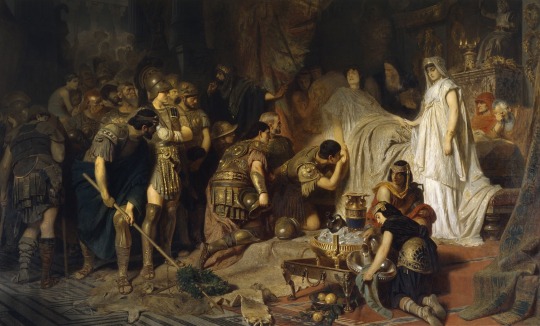
The Dying Alexander the Great bids farewell to his Army
by Karl von Piloty
#alexander the great#dying#bed#art#karl von piloty#army#soldiers#alexander#antiquity#history#europe#european#ancient macedonia#macedonian#macedonia#ancient greek#ancient greece#death#generals#roxana#roxanna#roxane#roxanne
184 notes
·
View notes
Note
What do you think was the best (and worst) moment in Alexander's life?
The worst moment is easy. Even the ancient historians agree it was the death of Hephaistion. Although, his murder of Kleitos might be a close second. Define "worst." Most emotionally painful or most terribly shameful?
For best...there are a couple possibilities. I think it would be hard to call either Issos or Gaugamela an unqualified win for him, as Darius got away in both cases, and I suspect he was more frustrated after than happy. The Granikos victory would be better, as it was a clear win--and the first one, proving Macedonians could take on a Persian army...if not a big one.
But another that might vie for best would have been his entry into Babylon. The conquering hero. Darius was still out there, but for the moment, he was the unquestioned master of Asia. Susa is another possibility. I wouldn't say Persepolis, as that was a fight getting there, and extremely violent. Everything after is problematic in one way or another.
Finding a "best" moment for Alexander is difficult, because he was so future-focused. As soon as he'd achieved one end, his eyes were on the horizon for the next goal: his "pothos" drove him. Ergo, I'm not sure he was EVER entirely satisfied/happy.
I suspect his "best" moment might be one the histories don't tell us, because it was highly personal.
#asks#Alexander the Great#Alexander's pothos#Hephaistion#Hephaestion#Kleitos#Cleitus#Battle of Granikos#Entry into Babylon#Classics#ancient Macedonia
17 notes
·
View notes
Text

This week's main project: Macedonian pezhetairoi (foot companions)
Going back to (predominately) traditional method for these boys and yes, it does take longer. I still have the shields to do before I base them, though.
I painted these with the intent of using them with Warlord Games' SPQR skirmish ruleset, a game they're sadly phasing out due to the very understandable reason that they make a lot of games and can't focus on all of them. But, I might base my SPQR warbands on square bases anyway, where applicable, for use in Hail Caesar, their mass-battle ancients ruleset. Maybe not these ones, though. If I get into Hail Caesar, it'll mean painting these by the HUNDREDS (seriously, the starter army for the successor states has a full hundo of these pointy lads... and a war elephant!) and I might want to find a faster scheme?? idk... I'm more excited about the bronze age range for HC, but I can see myself getting more into these other periods too.
Oh no, am I becoming a...
historical wargamer???
#warlord games#spqr#hail caesar#miniature painting#miniatures#macedonians#pezhetairoi#pointy lads#wargaming#historical
7 notes
·
View notes
Photo

Achaemenid Kings List & Commentary
The Achaemenid Empire (c. 550-330 BCE) was the first great Persian political entity in Western and Central Asia which stretched, at its peak, from Asia Minor to the Indus Valley and Mesopotamia through Egypt. It was founded by Cyrus II (the Great, r. c. 550-530 BCE) whose vision of a vast, all-inclusive Persian Empire was, more or less, maintained by his successors.
The Persians arrived in the region of modern-day Iran as part of a migratory group of Aryans (meaning “noble” or “free” and referencing a class of people, not a race). The Aryans – made up of many tribes such as the Alans, Bactrians, Medes, Parthians, and Persians, as well as others – settled in the area which became known as Ariana (Iran) – “the land of the Aryans”. The tribe which eventually became known as the Persians settled at Persis (modern-day Fars) which gave them their name.
Artaxerxes V (r. 330-329 BCE) was the short-lived throne name of Bessus, satrap of Bactria, who assassinated Darius III and proclaimed himself king. Alexander the Great found the dead or dying Darius III (the original accounts vary on this) in a cart where Bessus had left him and gave him a proper burial with all honors. Afterwards, Alexander had Bessus executed and took for himself the honor of the title Shahanshah, the king of kings of the Achaemenid Empire.
Conclusion
Although the Achaemenid Empire was no longer what it had been under Darius I, it was still intact when Alexander conquered it. He attempted a synthesis of Greek and Persian cultures by marrying his soldiers to Persian women, elevating Persian officers to high rank in his army, and comporting himself as a Persian king. His efforts were not appreciated by the Greek/Macedonian army and, after his death in 323 BCE, his vision was abandoned. Since he had named no clear successor at the time of his death, his generals went to war with each other to claim supremacy.
These wars (known as the Wars of Diadochi, 322-275 BCE), resulted, in part, in the rise of the Seleucid Empire (312-63 BCE) under Alexander's general Seleucus I Nicator (r. 305-281 BCE). The Seleucid Empire occupied approximately the same regions as the Achaemenid and, though it rose to a position of strength, gradually lost territory, first to the Parthians and then later to Rome. The Seleucids were succeeded by the Parthian Empire (247 BCE- 224 CE) which fell to the Sassanian Empire (224-651 CE). The Sassanians revived the best aspects of the Achaemenid Empire and would become the greatest expression of Persian culture in the ancient world.
The Sassanian Empire preserved the culture of the Achaemenids and, even after its fall to the invading Muslim Arabs, this culture would endure and spread throughout the ancient world. Many aspects of life in the modern day, from the seemingly mundane of birthday parties, desserts, and teatime to the more sublime of monotheism, mathematics, and aspects of art and architecture, were developed by the Sassanians drawing on the model of the Achaemenid Empire.
Continue reading...
39 notes
·
View notes
Text
Favorite Historical Miniatures Armies:
The Chaos Gods and the Primarchs
(The Emperor, of course, always plays with an Alexandrian Macedonian Army. In every period. And he always wins….)
Hashut:
Ancients - Assyrians, of course.
Khorne:
Colonials - Bavarian Nuns, Wahehe War, German East Africa.
Malal:
I mean, I’ll happily play with any army known as an unreliable ally…
Nuffle:
Does not fully grasp the concept. Routinely brings a “Magnetic Action Football” set. Given he’s the god of random chance, however… he often wins.
Nurgle:
Quite happy to play any army at the height of the Black Plague
Tzeentch:
Ancients - Early Maya. Soooo many feathers!
Lion El’Johnson:
Medievals - Crusader Militant Orders
Fulgrim:
Ancients - Purple, Hellenism, Fancy. Hence, Seleucids
Perturabo:
Ancients - Gee… I wonder. But also, heavy siege tanks. So, Ferdinands, Brummbars, Sturmtigers make him positively turgid.
Khan:
Medievals - Really? You really don’t know?
Leman Russ:
WW2 - Norwegians. Danes from time to time. He despises Nazis, and ordinary Vikings are… boring.
Rogal Dorn:
Ancients - Pretty much anything Roman will do.
Konrad Curze:
Renaissance - Prefers Later Hungarians. Will grimace and accept playing with a Wallachian Army if he must.
Sanguinius:
Ancients - Early Hebrews. Also loves running German Triplanes in WW1 games. Richtofen’s Flying Circus, of course.
Ferrus Manus:
Anything with lots of slow moving disgustingly armored stuff. WW1 tank forces, for instance.
Angron:
WW1 - Portuguese Expeditionary Force. A glutton for punishment.
Roboute Guilliman:
ALSO anything Roman. But there must be shiny eagles involved.
Mortarion:
Not much fun. Always insists on bringing the bio-chem warfare units. Every period.
Magnus:
Not really a fan of Egyptian Armies as such. Surprisingly, likes himself a good group of doughty British colonials, circa 1879. Eh wot?
Horus:
Enjoys selecting the worst possible Army or force for the period in question, and proving that he can beat you with it.
Lorgar:
Lorgar constantly attempts to design his own house rules for armies and periods only he wants to play. Once spent a summer running the other Primarchs through the Great Toledo War.
Vulkan:
Appreciates the entertainment of war games, but prefers the abstracts. Problematically, however, he -can-defeat your elite armored division using just the red side from a set of checkers.
Corvus Corax:
WW2 - Big fan of paratroopers. Refuses on principle to play the bad guys.
Alpharius:
Once defeated a modern British Armored Division equipped with Challenger 2s…
Omegon:
…using a group of English Civil War clubmen and a Japanese Type 97 “Chi Ha” with a broken timing chain.
17 notes
·
View notes